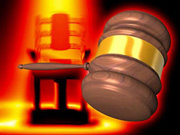| Reversing the U.S. 9th Circuit Court of Appeals in another murder case, the Supreme Court today restored a death sentence for a Washington state man who abducted, tortured and killed a young woman near Seattle. Cal Brown, who confessed to the crime, was convicted and sentenced to death by a jury in 1993. But the 9th Circuit Court overturned his death sentence last year, saying the trial judge had wrongly excluded a juror who expressed qualms about capital punishment. In a 5-4 decision, the Supreme Court upheld the decision of the trial judge and said the 9th Circuit erred by intervening. "It is not for us to second-guess the determination" of the trial judge over whether a potential juror is willing to follow the law, Justice Anthony M. Kennedy said. He said the prosecutor and the judge had ample reason for excusing the man, referred to as Juror Z, because he had said the death penalty was appropriate only if the killer might be released and kill again. In Washington, as in California, that was not a possibility in a case such as this one. The defendant, if convicted of aggravated murder, would be sentenced either to life in prison without parole or to death. The prosecutor asked to have Juror Z excluded, saying his comments suggested he would reject the death penalty for Brown. The defense lawyer replied, "We have no objection." Nonetheless, the move -- seemingly minor at the time -- led to the reversal of Brown's death sentence more than 12 years later by the San Francisco-based appeals court. The Supreme Court was sharply split along conservative-liberal lines in its decision. Justice John Paul Stevens delivered a strong dissent in the courtroom. By allowing prosecutors to exclude jurors who have qualms about the capital punishment, the court will encourage the formation of juries "unfairly biased in favor of the death penalty," Stevens said. "Millions of Americans oppose the death penalty," and juries are supposed to represent a cross section of the community, he argued. He said jurors who pledged to follow the law in death penalty cases should be seated, even if they expressed doubts about the use of such punishment. Justices David H. Souter, Ruth Bader Ginsburg and Stephen G. Breyer joined his dissent in the case of Uttecht vs. Brown. |





